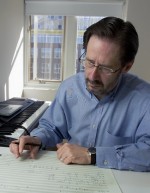Column Name
Title
The Juilliard School deeply mourns the death of faculty member Steven Stucky, who died on February 14, 2016.
Body
A 2005 Pulitzer Prize-winning composer who started out studying viola and focused on conducting and composition in college, Steven Stucky joined the Juilliard faculty this fall. He grew up in Kansas and Texas, and studied at Baylor and Cornell, earning a bachelor’s, master’s, and doctorate along the way; his teachers included Burrill Phillips (Juilliard faculty 1968-69). Among the schools where he’s taught are Cornell, where he’s now a professor emeritus, Eastman, and the University of California at Berkeley. He was affiliated with the Los Angeles Philharmonic for more than 20 years in various composition capacities, and from 2005 to 2009 hosted the New York Philharmonic’s Hear and Now concert series. Among the many albums of his work, two, Cradle Songs and Whispers, which were both commissioned and recorded by Chanticleer, won Grammys. His book Lutoslawski and His Music (Cambridge University Press) came out in 1981, and his comic opera The Classical Style: An Opera (of Sorts) premiered this summer.
On February 24 (2015), the Juilliard Orchestra will perform your Dreamwaltzes (1986). The Pittsburgh Post-Gazette wrote that the piece “is not about recalling Strauss or Brahms in their time, but how Mr. Stucky, and perhaps the audience, interacts with this music today.” Is that a fair description?
I like that description. We can long for certain comforts of older music but we can’t re-create the cultures that made that music tick. Dreamwaltzes is a series of daydreams about older music, but our present-day reality always intrudes, and we are always left gazing back from a distance.
An opera based on a textbook (The Classical Style by Charles Rosen, Pre-College ’39) is unexpected—what surprised you most about composing it?
I was delighted by how much humor Jeremy Denk (D.M.A. ’01, piano) was able to achieve in his libretto, and surprised (and relieved) that in response I was able to write funny music. Pleasantly surprised, too, that a broad audience is able to enjoy the opera, not only trained musicians and theory nerds.
The opera’s third outing, at Carnegie’s Zankel Hall in December, was perhaps the most satisfying yet: an engaged, savvy audience who laughed at all the jokes, and a wonderful level of polish from Maestro Robert Spano, the orchestra, plus a lively, inventive director, faculty member Mary Birnbaum. The cast, by the way, included four terrific Juilliard alums—soprano Jennifer Zetlan, mezzo Rachel Calloway, tenor Dominic Armstrong, and bass-baritone Aubrey Allicock—and the orchestra, the Knights, was founded by brothers Colin and Eric Jacobsen, who are also both alums.
You say you were surprised and relieved that you were able to write funny music. What makes music funny?
Mozart and especially Haydn understood this, of course, but for me it was a new learning experience. Of course there are the easy slapstick effects—the Mozart character complains about the famous “too many notes” line from Amadeus by singing a cadenza with way too many notes—but more satisfying, I think, are subtler things: playing with rhythmic timing, slipping in an unexpected harmony to underline a comic turn in the text, repeating an element once too often (a trick borrowed from Beethoven, who must have learned it from Haydn himself).
When did you first know you wanted to be a musician?
My earliest memories are of my fascination with the sound of classical music, and I began to dream of making those sounds myself long before I could read music or play an instrument.
Which teacher most inspired you?
My grade-school viola teacher, Herbert Preston, who (because we didn’t have money) gave me lessons in exchange for mowing his lawn—and many other exceptionally supportive public school teachers. I try to “pay forward” their kindness.
What was the first recording you remember?
My mother’s 78-rpm record collection, consisting of two albums: Peter and the Wolf and the “New World” Symphony. They say that I played them over and over—my ear pressed up against the speaker—instead of going outside with the other children. Behavior that would alarm any parent!
What are your nonmusic interests?
I love to read modern fiction (Haruki Murakami and Don DeLillo, for example) and popular neuroscience, and I follow cooking and politics. I am an obsessive foodie and fascinated by wines.
If money, time, sourcing, and culinary skills were no object, what would your ideal meal be?
I love all kinds of cuisines, from Cambodian to Polish. But my foodie heart always returns to Italy, where the perfect meal would be something straightforward but perfectly executed. Pasta with caccio e pepe in Rome, or a Bolognese sauce in Bologna itself, with that incredibly deep flavor achieved by long, slow cooking of the onion/carrot/celery/pancetta base, or even a simple bowl of rice and peas in Venice. Good enough for me!
What would people be surprised to know about you?
I love ice hockey and have been known to join in the bloodcurdling chants at Cornell hockey games.
What are you listening to these days?
I recently listened to composition applicants for Aspen, and I love hearing just how many of these 20-somethings are really good. The future of composition remains very bright!
If you weren’t in the career you are in, what would you be doing?
I’m lucky that the music thing worked out, because I never had a Plan B. But I also love writing words, so perhaps I could have tried writing? I’m just happy that Plan A came through.





